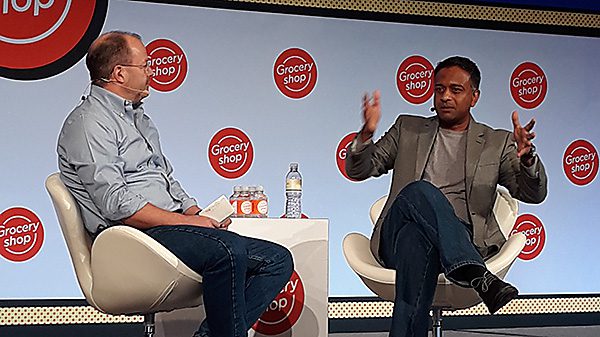Narayan Iyengar of Albertsons, right, is interviewed by James McCann, CEO of McCann Investments at Groceryshop 2019 in Las Vegas.
LAS VEGAS—What’s the future of ecommerce as it relates to supermarkets? There was ample discussion on the topic on Day 2 of Groceryshop, with several buzzwords like micro-fulfillment and cross functionality bandied about.
Is the future big sheds or micro-fulfillment centers? How important is automation and what impact does it have on associates? Who will rule when it comes to the last mile?
Narayan Iyengar, senior vice president of digital and ecommerce for Albertsons, believes there’s a middle ground between the two extremes. The type of customer and region dictate operational functions, including the type of fulfillment. Albertsons has 20 banners and began grocery delivery back in 2002; it now has 1,000 trucks and offers both delivery and pickup at stores.
Big sheds are needed near large densely populated areas, while micro-fulfillment can serve suburban areas. Optimizing the process and having the right tools and the right people, Iyengar says, are key.
Toronto-based Loblaw Companies has 2,500 stores across Canada and 20 distribution centers. Last year alone, the company hired 1,000 new associates to help with its ecommerce operations, and Garry Senecal, chief customer officer, says its workforce continues to evolve through cross functionality.
Senecal stresses the importance of feedback from customers and associates and says retailers must be open to changing their views—every day—if that’s what it takes to break out of “ritual relationships” to be more customer-centric and responsive.
Kelly Caruso, CEO of Shipt, and formerly of Target Corporation, also touts the importance of continuous improvement and how the personal touch or human connection is even more important today as a complement to technology and automation. Shipt delivery drivers are encouraged to forge relationships with customers, to stay a few minutes and chat, rather than race back to their truck.
LAS VEGAS—What’s the future of ecommerce as it relates to supermarkets? There was ample discussion on the topic on Day 2 of Groceryshop, with several buzzwords like micro-fulfillment and cross functionality bandied about.
Is the future big sheds or micro-fulfillment centers? How important is automation and what impact does it have on associates? Who will rule when it comes to the last mile?
Narayan Iyengar, senior vice president of digital and ecommerce for Albertsons, believes there’s a middle ground between the two extremes. The type of customer and region dictate operational functions, including the type of fulfillment. Albertsons has 20 banners and began grocery delivery back in 2002; it now has 1,000 trucks and offers both delivery and pickup at stores.
Big sheds are needed near large densely populated areas, while micro-fulfillment can serve suburban areas. Optimizing the process and having the right tools and the right people, Iyengar says, are key.
Toronto-based Loblaw Companies has 2,500 stores across Canada and 20 distribution centers. Last year alone, the company hired 1,000 new associates to help with its ecommerce operations, and Garry Senecal, chief customer officer, says its workforce continues to evolve through cross functionality.
Senecal stresses the importance of feedback from customers and associates and says retailers must be open to changing their views—every day—if that’s what it takes to break out of “ritual relationships” to be more customer-centric and responsive.
Kelly Caruso, CEO of Shipt, and formerly of Target Corporation, also touts the importance of continuous improvement and how the personal touch or human connection is even more important today as a complement to technology and automation. Shipt delivery drivers are encouraged to forge relationships with customers, to stay a few minutes and chat, rather than race back to their truck.
Taryn Pfalzgraf is the Senior Editorial Manager for Blue Book Services.



